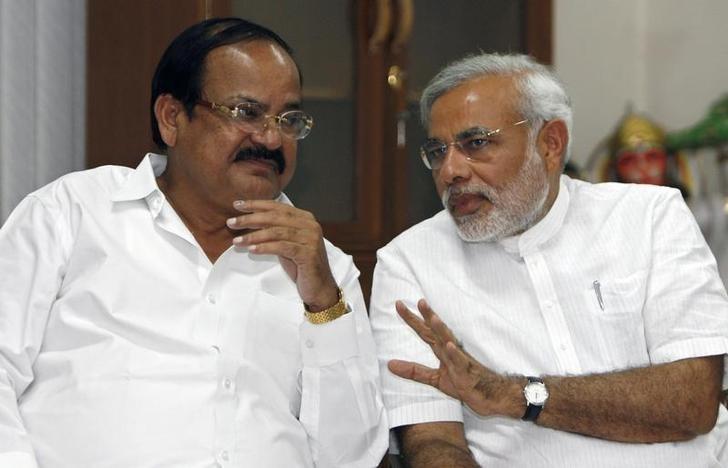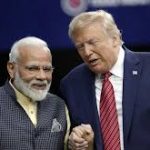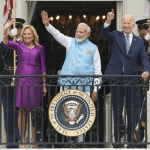 India’s ruling party candidate M. Venkaiah Naidu was elected vice president in a parliamentary vote on Saturday, enabling the party to boost its political standing in his southern home region where it lacks a broad support base.
India’s ruling party candidate M. Venkaiah Naidu was elected vice president in a parliamentary vote on Saturday, enabling the party to boost its political standing in his southern home region where it lacks a broad support base.
Naidu, 68, from the state of Andhra Pradesh and a former president of the Bharatiya Janata Party (BJP), defeated opposition nominee Gopalkrishna Gandhi, grandson of independence hero Mahatma Gandhi, by a wide margin.
The position of vice president, like that of president, is largely ceremonial under India’s constitution, in which the prime minister and his cabinet colleagues wield executive power.
However, the vice president is also the speaker of the Rajya Sabha, or upper house of parliament, where Prime Minister Narendra Modi’s ruling coalition lacks a majority and has faced problems in passing legislation.
Naidu’s victory in the vote by both houses was a foregone conclusion because of the BJP’s commanding majority in the 545-member lower house, which more than makes up for its weakness in the upper house.
Recently elected President Ram Nath Kovind and Naidu were both associated with the Rashtriya Swayamsevak Sangh, or National Volunteer Corps, the ideological fountainhead of Hindu groups, early in their political careers.
Kovind, backed by the ruling Hindu nationalist right, easily won India’s presidential election last month, tightening its hold on positions of power.
 India’s ruling party candidate M. Venkaiah Naidu was elected vice president in a parliamentary vote on Saturday, enabling the party to boost its political standing in his southern home region where it lacks a broad support base.
India’s ruling party candidate M. Venkaiah Naidu was elected vice president in a parliamentary vote on Saturday, enabling the party to boost its political standing in his southern home region where it lacks a broad support base.
Naidu, 68, from the state of Andhra Pradesh and a former president of the Bharatiya Janata Party (BJP), defeated opposition nominee Gopalkrishna Gandhi, grandson of independence hero Mahatma Gandhi, by a wide margin.
The position of vice president, like that of president, is largely ceremonial under India’s constitution, in which the prime minister and his cabinet colleagues wield executive power.
However, the vice president is also the speaker of the Rajya Sabha, or upper house of parliament, where Prime Minister Narendra Modi’s ruling coalition lacks a majority and has faced problems in passing legislation.
Naidu’s victory in the vote by both houses was a foregone conclusion because of the BJP’s commanding majority in the 545-member lower house, which more than makes up for its weakness in the upper house.
Recently elected President Ram Nath Kovind and Naidu were both associated with the Rashtriya Swayamsevak Sangh, or National Volunteer Corps, the ideological fountainhead of Hindu groups, early in their political careers.
Kovind, backed by the ruling Hindu nationalist right, easily won India’s presidential election last month, tightening its hold on positions of power.
 India’s ruling party candidate M. Venkaiah Naidu was elected vice president in a parliamentary vote on Saturday, enabling the party to boost its political standing in his southern home region where it lacks a broad support base.
India’s ruling party candidate M. Venkaiah Naidu was elected vice president in a parliamentary vote on Saturday, enabling the party to boost its political standing in his southern home region where it lacks a broad support base.
Naidu, 68, from the state of Andhra Pradesh and a former president of the Bharatiya Janata Party (BJP), defeated opposition nominee Gopalkrishna Gandhi, grandson of independence hero Mahatma Gandhi, by a wide margin.
The position of vice president, like that of president, is largely ceremonial under India’s constitution, in which the prime minister and his cabinet colleagues wield executive power.
However, the vice president is also the speaker of the Rajya Sabha, or upper house of parliament, where Prime Minister Narendra Modi’s ruling coalition lacks a majority and has faced problems in passing legislation.
Naidu’s victory in the vote by both houses was a foregone conclusion because of the BJP’s commanding majority in the 545-member lower house, which more than makes up for its weakness in the upper house.
Recently elected President Ram Nath Kovind and Naidu were both associated with the Rashtriya Swayamsevak Sangh, or National Volunteer Corps, the ideological fountainhead of Hindu groups, early in their political careers.
Kovind, backed by the ruling Hindu nationalist right, easily won India’s presidential election last month, tightening its hold on positions of power.
 India’s ruling party candidate M. Venkaiah Naidu was elected vice president in a parliamentary vote on Saturday, enabling the party to boost its political standing in his southern home region where it lacks a broad support base.
India’s ruling party candidate M. Venkaiah Naidu was elected vice president in a parliamentary vote on Saturday, enabling the party to boost its political standing in his southern home region where it lacks a broad support base.
Naidu, 68, from the state of Andhra Pradesh and a former president of the Bharatiya Janata Party (BJP), defeated opposition nominee Gopalkrishna Gandhi, grandson of independence hero Mahatma Gandhi, by a wide margin.
The position of vice president, like that of president, is largely ceremonial under India’s constitution, in which the prime minister and his cabinet colleagues wield executive power.
However, the vice president is also the speaker of the Rajya Sabha, or upper house of parliament, where Prime Minister Narendra Modi’s ruling coalition lacks a majority and has faced problems in passing legislation.
Naidu’s victory in the vote by both houses was a foregone conclusion because of the BJP’s commanding majority in the 545-member lower house, which more than makes up for its weakness in the upper house.
Recently elected President Ram Nath Kovind and Naidu were both associated with the Rashtriya Swayamsevak Sangh, or National Volunteer Corps, the ideological fountainhead of Hindu groups, early in their political careers.
Kovind, backed by the ruling Hindu nationalist right, easily won India’s presidential election last month, tightening its hold on positions of power.
 India’s ruling party candidate M. Venkaiah Naidu was elected vice president in a parliamentary vote on Saturday, enabling the party to boost its political standing in his southern home region where it lacks a broad support base.
India’s ruling party candidate M. Venkaiah Naidu was elected vice president in a parliamentary vote on Saturday, enabling the party to boost its political standing in his southern home region where it lacks a broad support base.
Naidu, 68, from the state of Andhra Pradesh and a former president of the Bharatiya Janata Party (BJP), defeated opposition nominee Gopalkrishna Gandhi, grandson of independence hero Mahatma Gandhi, by a wide margin.
The position of vice president, like that of president, is largely ceremonial under India’s constitution, in which the prime minister and his cabinet colleagues wield executive power.
However, the vice president is also the speaker of the Rajya Sabha, or upper house of parliament, where Prime Minister Narendra Modi’s ruling coalition lacks a majority and has faced problems in passing legislation.
Naidu’s victory in the vote by both houses was a foregone conclusion because of the BJP’s commanding majority in the 545-member lower house, which more than makes up for its weakness in the upper house.
Recently elected President Ram Nath Kovind and Naidu were both associated with the Rashtriya Swayamsevak Sangh, or National Volunteer Corps, the ideological fountainhead of Hindu groups, early in their political careers.
Kovind, backed by the ruling Hindu nationalist right, easily won India’s presidential election last month, tightening its hold on positions of power.
 India’s ruling party candidate M. Venkaiah Naidu was elected vice president in a parliamentary vote on Saturday, enabling the party to boost its political standing in his southern home region where it lacks a broad support base.
India’s ruling party candidate M. Venkaiah Naidu was elected vice president in a parliamentary vote on Saturday, enabling the party to boost its political standing in his southern home region where it lacks a broad support base.
Naidu, 68, from the state of Andhra Pradesh and a former president of the Bharatiya Janata Party (BJP), defeated opposition nominee Gopalkrishna Gandhi, grandson of independence hero Mahatma Gandhi, by a wide margin.
The position of vice president, like that of president, is largely ceremonial under India’s constitution, in which the prime minister and his cabinet colleagues wield executive power.
However, the vice president is also the speaker of the Rajya Sabha, or upper house of parliament, where Prime Minister Narendra Modi’s ruling coalition lacks a majority and has faced problems in passing legislation.
Naidu’s victory in the vote by both houses was a foregone conclusion because of the BJP’s commanding majority in the 545-member lower house, which more than makes up for its weakness in the upper house.
Recently elected President Ram Nath Kovind and Naidu were both associated with the Rashtriya Swayamsevak Sangh, or National Volunteer Corps, the ideological fountainhead of Hindu groups, early in their political careers.
Kovind, backed by the ruling Hindu nationalist right, easily won India’s presidential election last month, tightening its hold on positions of power.
 India’s ruling party candidate M. Venkaiah Naidu was elected vice president in a parliamentary vote on Saturday, enabling the party to boost its political standing in his southern home region where it lacks a broad support base.
India’s ruling party candidate M. Venkaiah Naidu was elected vice president in a parliamentary vote on Saturday, enabling the party to boost its political standing in his southern home region where it lacks a broad support base.
Naidu, 68, from the state of Andhra Pradesh and a former president of the Bharatiya Janata Party (BJP), defeated opposition nominee Gopalkrishna Gandhi, grandson of independence hero Mahatma Gandhi, by a wide margin.
The position of vice president, like that of president, is largely ceremonial under India’s constitution, in which the prime minister and his cabinet colleagues wield executive power.
However, the vice president is also the speaker of the Rajya Sabha, or upper house of parliament, where Prime Minister Narendra Modi’s ruling coalition lacks a majority and has faced problems in passing legislation.
Naidu’s victory in the vote by both houses was a foregone conclusion because of the BJP’s commanding majority in the 545-member lower house, which more than makes up for its weakness in the upper house.
Recently elected President Ram Nath Kovind and Naidu were both associated with the Rashtriya Swayamsevak Sangh, or National Volunteer Corps, the ideological fountainhead of Hindu groups, early in their political careers.
Kovind, backed by the ruling Hindu nationalist right, easily won India’s presidential election last month, tightening its hold on positions of power.
 India’s ruling party candidate M. Venkaiah Naidu was elected vice president in a parliamentary vote on Saturday, enabling the party to boost its political standing in his southern home region where it lacks a broad support base.
India’s ruling party candidate M. Venkaiah Naidu was elected vice president in a parliamentary vote on Saturday, enabling the party to boost its political standing in his southern home region where it lacks a broad support base.
Naidu, 68, from the state of Andhra Pradesh and a former president of the Bharatiya Janata Party (BJP), defeated opposition nominee Gopalkrishna Gandhi, grandson of independence hero Mahatma Gandhi, by a wide margin.
The position of vice president, like that of president, is largely ceremonial under India’s constitution, in which the prime minister and his cabinet colleagues wield executive power.
However, the vice president is also the speaker of the Rajya Sabha, or upper house of parliament, where Prime Minister Narendra Modi’s ruling coalition lacks a majority and has faced problems in passing legislation.
Naidu’s victory in the vote by both houses was a foregone conclusion because of the BJP’s commanding majority in the 545-member lower house, which more than makes up for its weakness in the upper house.
Recently elected President Ram Nath Kovind and Naidu were both associated with the Rashtriya Swayamsevak Sangh, or National Volunteer Corps, the ideological fountainhead of Hindu groups, early in their political careers.
Kovind, backed by the ruling Hindu nationalist right, easily won India’s presidential election last month, tightening its hold on positions of power.













